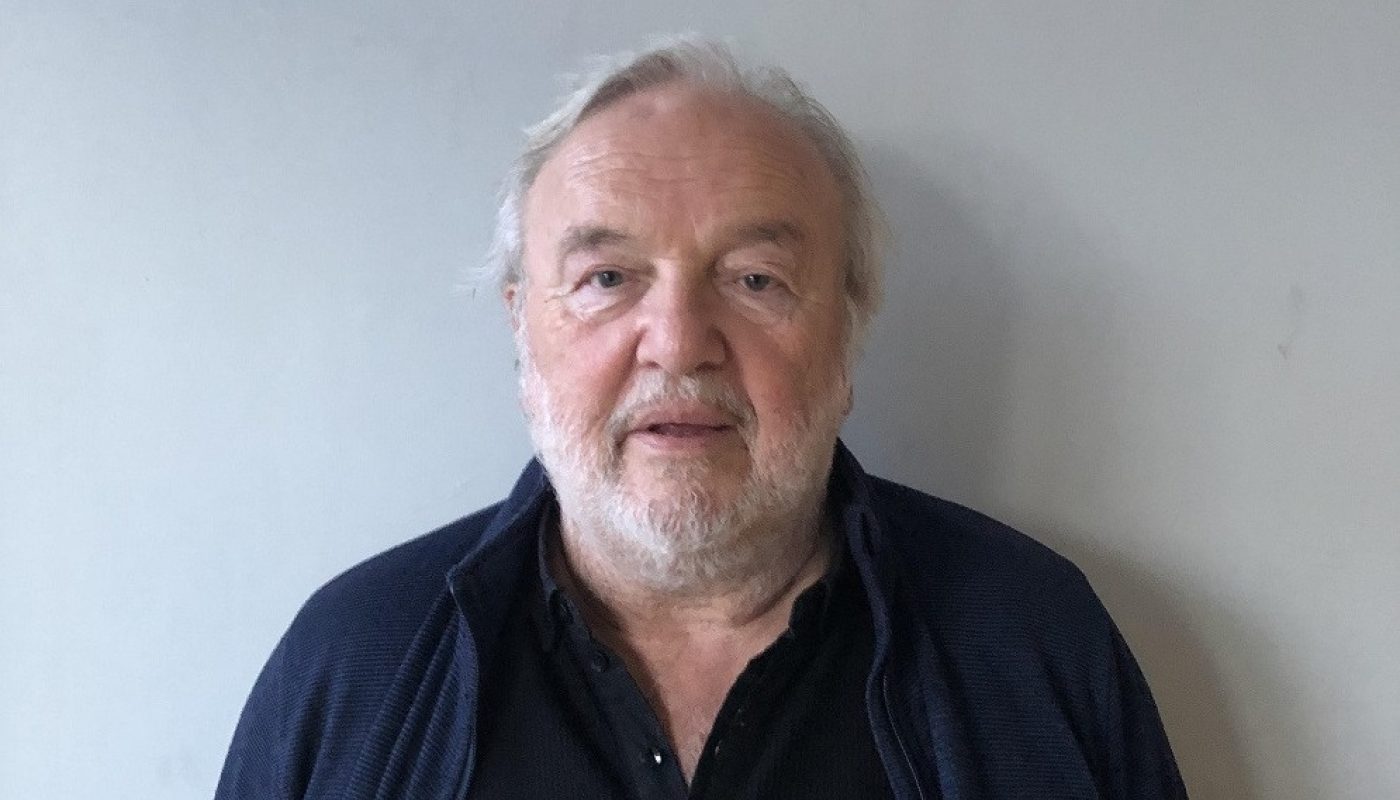

Drie vragen aan ... Karel Deburchgrave
Film critic Karel Deburchgrave will teach the Youth Jury the basics of understanding film.
Geplaatst op 7 augustus 2020Karel Deburchgrave is a film critic and the chairman of the Belgian film magazine Filmmagie, which was founded in 1956. Karel Deburchgrave has been a member of many film festivals, including Karlovy Vary (2008), Las Palmas de Gran Canaria (2011), Prix Italia Torino (2011), Hong Kong (2012), Montreal (2012), Berlin (2014), Film Fest Washington DC (2015) and Singapore (2019). He also gives lectures on film at film museums and universities. At the SHIFT Film Festival he will coach the Youth Jury in the field of film analysis.
"You write about what you know best, about what you consider relevant, authentic or morally right."
What, according to you, makes a good movie?
"To all questions there are simple and complex answers. Let's start with an easy reply: a good movie appeals to me when I feel I haven't wasted my time watching it in a theatre or at home. You can switch channels or leave the theatre but out of respect for the makers, I hardly ever do. That is a good thing, too, because, being an absolute football ignoramus, I reluctantly watched British filmmaker Asif Kapadia's Diego Maradona last week and was unexpectedly charmed by this documentary. That week I also watched Da 5 Bloods as I'm a great admirer of Spike Lee. His Do the Right Thing is still the best film against racism ever but his latest Da 5 Bloods, also unexpectedly, felt more like a cheap black Rambo film to me. A disappointment and a waste of time, 2 hours and 34 minutes to be precise, but nevertheless an interesting failure in Lee's more than 50 films oeuvre. 'To make a film is easy', Iñárritu said. 'To make a good film is war. To make a very good film is a miracle'."
"What are the three ingredients of a good film? A good story, a good story and a good story, I used to say. Linear or non-linear, like most of the Tarantino films. Preferably with a subtext like Jane Campion's mysterious film The Piano, re-released now after 25 years. Actress Holly Hunter plays Ada, a 19th-century Scottish woman who is sold by her father to marry a colonist in New Zealand. She is mute but expresses herself by playing the piano and through sign language. Her young daughter Flora (Anna Paquin) is acting as a translator. Her husband Steward (Sam Neill) comes to collect Ada and Flora on the beach where they landed but he refuses to transport Ada’s piano back to his house. The instrument instead is purchased by Baines (Harvey Keitel), an old sailor who has gone native and has facial Maori tattoos. He strikes a deal with Ada: she can earn her piano back one key at a time, by playing at his home while he does 'things he likes'. Ada has to choose between sex and art. Gradually Ada feels sympathy for her blackmailer and the piano generates the music of their secret love, in stark contrast to her chilly marital relations at home. The Piano is a great female-centred story with fascinating characters outstandingly performed. Stuart Dryburgh's dark cinematography and Michael Nyman's swelling score have turned it into a feminist classic!"
"So, a good story, fascinating characters brilliantly performed, excellent cinematography and a compelling score make a good movie. Add to these the subtext of this strange story of sexuality denied and displaced and you get a brilliant portrayal of female desire and creativity. With one of the most interesting uses of symbolisms in modern cinema: the piano as an extension of Ada herself and an obvious symbol of the vulnerability and treatment of women. Men of both cultures treat it roughly: Maori manhandle it through the bush, and thump unmusically on it when it is moved to Stewart's house; Stewart keeps time coarsely on its frame as Flora plays for him. Baines' acquaintances too, clearly regard it as unmanly to learn to play the piano. The physicality of the piano and its connection to Ada's body is emphasised on many occasions by both Ada and Baines: by Baines who bargains parts of Ada's piano in return for parts of her body he is given permission to touch and see. In Ada's absence, he strips naked to delicately and lovingly dust the piano. It takes a tattooed white man gone native to understand the language of women!"
Is the analysis of film a matter of taste or a 'science'?
"Both! Is filmmaking an art or a science? Here again my answer is 'both'. If film making were only a science you could study, then how to explain that our greatest directors never attended filmschool. Luis Buñuel was an ornithologist; Christopher Nolan studied English Literature; Terry Gilliam, Political Sciences; Wes Anderson, Philosophy; Paul Thomas Anderson spent only two semesters studying English in Emerson College and Stanley Kubrick was a freelance photographer. Last but not least, Quentin Tarantino dropped out of school at 15 to work in Video Archives, where he learned a lot about cinema. Hence his famous saying: 'I did not go to film school, I went to films'."
"The same goes for film critics. I myself studied English, Dutch and German literature and …went to films. So I guess that's why I usually write reviews on Shakespeare, Oscar Wilde or other literary adaptations. You write about what you know best, about what you consider relevant, authentic or morally right. Evidently some essential knowledge or science is required. So when you write about recent German films like von Donnersmarck's Das Leben der Anderen and Werk ohne Autor, Wolfgang Becker's Good Bye Lenin!, Michael Herbig's Ballon, Christian Petzold's Barbara or TV series like Weissensee and Deutschland 83, 86 and 89 you'd better be well informed about the Stasi and why 9 November 1989 was such a pivotal event in world history."
"Is the analysis of film a matter of taste? Cronenberg's Crash, just like The Piano re-released now and also featuring actress Holly Hunter, provides a good example of taste. Crash tells the story of Catherine and James Ballard, a couple in an open relationship who are drawn into the world of Vaughan, a car-crash freak who can only achieve sexual fulfilment by instigating collisions on the motorways surrounding Heathrow. His hobby: recreating famous car accidents like the ones of James Dean or Jane Mansfield. At its world premiere at the Cannes film festival of 1996, Crash caused an unparalleled media furore. Film critic Alexander Walker headlined his review as being 'beyond the bounds of depravity', and called it pornography, containing 'some of the most perverted acts and theories of sexual deviance I have ever seen propagated in mainline cinema'. The Daily Mail described the film as 'The point at which even a liberal society must draw the line'. The Telegraph only needed three adjectives: 'disgusting, depraved and debauched'. Such were the feelings of three respectable film critics."
"Now compare these ‘Crash is trash’ verdicts to the fact that Cronenberg's controversial cult classic got a special Cannes jury prize for originality, daring, and audacity. Another well-respected American film critic Jonathan Rosenbaum described it as, 'almost as pared down and purified as late Robert Bresson'. Martin Scorsese argued that Cronenberg's best films 'provoke a Jungian cultural shock, like the films of Buñuel, centred on the theme of Eros and Thanatos.' So, Crash has earned its place among Buñuel’s Belle de Jour, Michael Powell's Peeping Tom, Pasolini's Salo and Oshima's Empire of the Senses."
"The Crash controversy proves the famous saying: 'la critique, c'est une personne'. So, who is right? Trust your own judgement. If you want to know what I think of Crash, read my (Dutch) review Crash: Auto Erotiek in Doorbraak.be."
After reviewing films for many years, can you see differences in films made in different decades by different generations? Do you notice specific shifts that have been made throughout the years?
"There are of course the obvious shifts that have been made throughout the years. The technology surge to start with; black-and-white silents to colour and Dolby; editing by physically cutting film strips to computer editing; the invention of digital cameras and projection. Also a new approach in acting from melodramatic to natural and the more tolerant attitude of the audience to accept explicit sexual and violent contents. The way we watch movies has changed so much, that what we experience today is basically unrecognizable from the past. What used to be only accessible in theatres, is now to be seen at any given time with a computer and internet connection. Very useful in corona times! Initially unveiled in 2007, Netflix's streaming service puts thousands of movies at the consumer's fingertips, providing instant access to what used to be only visible in film museums."
"One Shakespearean observation, however, to these developments' The famous dictum 'Less is more' still counts today because if you only depend on technological stuff you merely get movies that are but 'walking shadows, with players that strut and fret their hour upon the stage, and then are heard no more; movies with a tale told by an idiot, full of Dolby sound and fury, signifying nothing'."

Workshop | Understanding Film: Learn How to Watch Films Analytically and Write Your Own Film Review
by Karel Deburchgrave
September 5, 11.00-15.00 & September 12, 10.00 -14.00, online
(c) All visual material is used with permission.